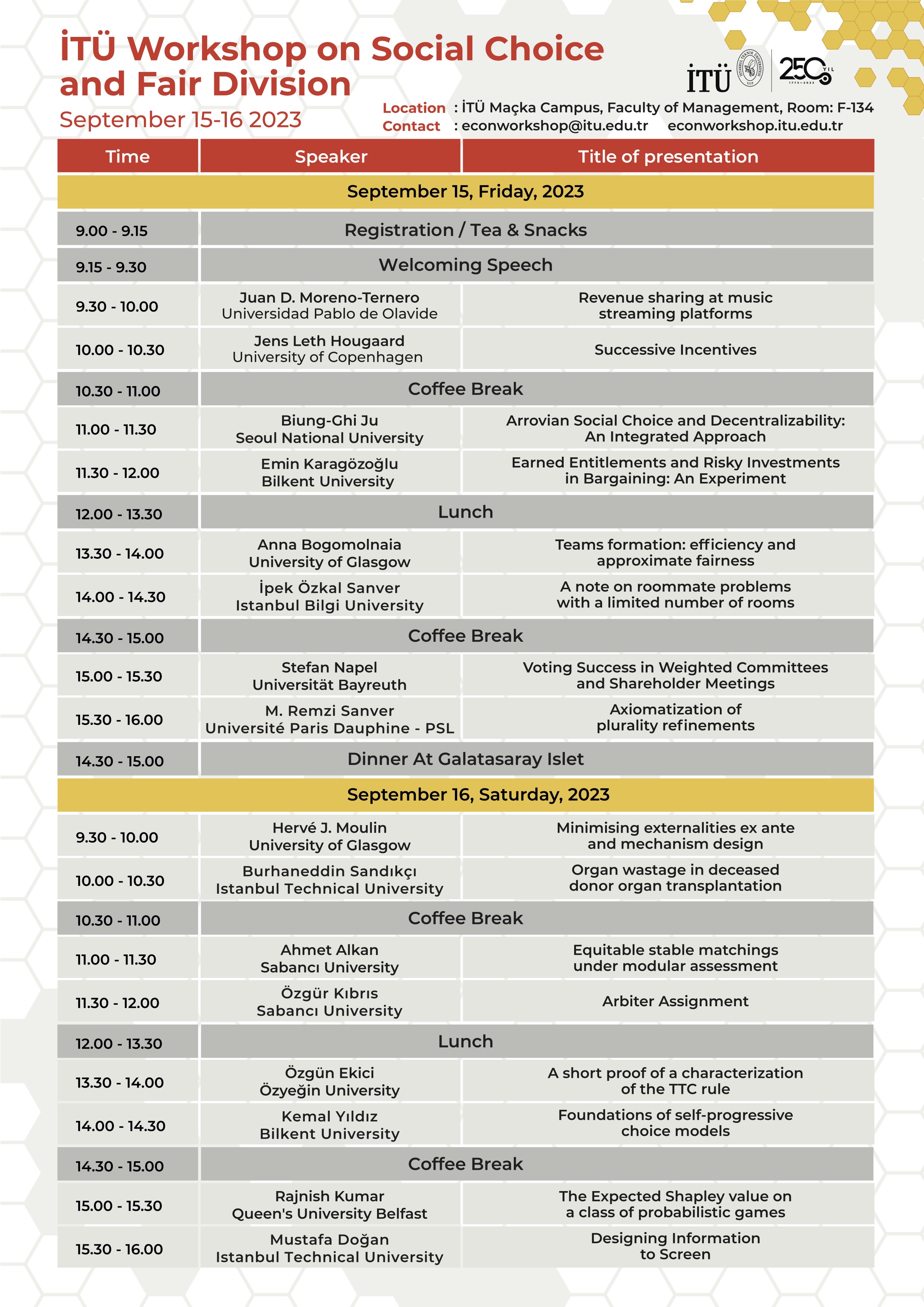
Ahmet Alkan
Sabancı University
Title: Equitable stable matchings under modular assessment
Abstract: We propose a framework for addressing issues of equity and social welfare in the stable matching model. We first establish an equivalence between an ordinal condition and modular optimization on the lattice of stable matchings. This equivalence charts out a domain where equity or welfare criteria separate over individuals and appear as weights in optimization. We call the ordinal condition convexity and the domain modular. Convexity requires stable “mixtures” of matchings in a solution to also be in the solution. We next propose a novel class of equitability criteria called equity undominance and characterize the modular stable matching rules that are equity undominated. Notably, the modular stable matching rules provide for clear testable implications and a wide range of specifications allowing efficient optimization.
Anna Bogomolnaia
University of Glasgow
Title: Teams formation: efficiency and approximate fairness
Abstract: A set of kn indivisible items is to be allocated to n agents; each agent is to get exactly k items (one might think of managers choosing teams of equal size). We consider models with cardinal or ordinal preferences, and look for efficient and approximately fair allocations. We work with notions of approximate fairness based on exchange of single objects, rather than on the mainstream idea of adding/subtracting objects. Our notions continue to operate within the meaningful domain of k-size bundles (“teams”) and are insensitive to positive affine transformations of utilities, hence do not require a separate treatment of “goods, “bads” and “mixed objects”. A famous Round Robin rule fares very well on all fairness accounts, but fails efficiency, while rules based on collective welfare maximisation (like Nash or Leximin) cannot guarantee fairness, except on some special sub domains (two agents, identical valuations, or binary utilities). For the model with ordinal input, using ordinal domination, we introduce notions of ordinal efficiency and approximate fairness, which prove to be compatible, and describe the sets of ordinally fair allocations. We also treat the case of lexicographic preferences.
Biung-Ghi Ju
Seoul National University
Title: Arrovian Social Choice and Decentralizability: An Integrated Approach
Abstract: Integrating aggregation problems (Arrovian social choice, classification, group identification, etc.) and allocation problems (social choice with transferable utilities, claims adjudication, cost or surplus sharing etc.) in a unified model, we establish the equivalence of independence of irrelevant alternatives (Arrow 1951), non-manipulability by reallocation (reallocation-proofness), and decentralizability. We provide a full characterization of collective decision rules satisfying any of the three equivalent axioms: they are represented as the sum of two components, the first is a default decision and the second is the weighted average of additive decisions in some key variables of the model. The representation theorem is used to derive several central results in the two strands of literature and to establish new findings, in particular, in group identification and classification problems.
Dinko Dimitrov
Universität des Saarlandes
Title: Blend-in fairness and equal split
Abstract: Blending in with others is a possible self-serving motivation when people participate in cooperative situations. We use this motivation to formulate a corresponding fairness principle, combine it with rather weak standard axioms from cooperative game theory, and show that it leads to equal split of coalitional gains. The same normative principles characterize this solution when only cohesive games (where it is optimal for the coalition of all players to form) are considered.
Emin Karagözoğlu
Bilkent University
Title: Earned Entitlements and Risky Investments in Bargaining: An Experiment
Abstract: We experimentally investigate risky investment decisions over jointly produced surplus, the impact of contributions to the surplus, risky investment decision, and outcome of investment decision on bargaining outcomes in an organizational setting with two agents. Agents' initial contributions to the bargaining surplus are determined in a real-effort task. Then, in three (between-subjects) treatments: an investment decision is taken by the computer, the low contributor, or the high contributor. Our results show that (i) the frequency of choosing the risky investment alternative is not affected by the agents' initial contributions, (ii) low contributors benefit from making the investment decision, and (iii) when low contributors make the investment decision, their shares of the bargaining surplus in agreements are affected from whether the risky investment turns out to be successful or not, whereas this is not true for high contributors when they make the decision. These observations point toward the possibility of asymmetric impact of decision authority and outcome bias in an organizational setting where parties bargain to share a jointly produced surplus.
Hervé J. Moulin
University of Glasgow
Title: The smallest gap from worst to best cases: a general definition of ex ante fairness
Abstract: The welfare guarantees implemented by an allocation rule capture the worst and best externalities imposed by the other agents of which the characteristics are unknown: at this ex ante stage I can only rely about these two parameters to accept the rule, or not. Maximising the worst case welfare, discussed first in mathematical cake-cutting stories more than 75 years ago is the most versatile normative principle in mechanism design. Minimising the best case welfare is an equally legitimate concern: it is not spiteful if the allocation or decision rule is efficient because allowing you higher potential gains ex ante must reduce those gains for some other agent(s). In most fair division problems, the designer can choose from a menu of maximal lower guarantees and/or minimal upper guarantees. Discovering these menus is a hard mathematical question, even in some very simple instances: but its solution produces sharp and meaningful choices for the designer. We will illustrate these statements in two examples: the commons problem with homogenous inputs and outputs and the allocation of indivisible goods (or bads) with transfers.
İpek Özkal Sanver
Istanbul Bilgi University
Title:
Abstract:
Jens Leth Hougaard
University of Copenhagen
Title: Succesive Incentives
Abstract: We study the design of optimal incentives in sequential processes. To do so, we consider a basic and fundamental model in which agents invest resources in extending a dynamic process. There exists a common success rate, which is increasing in the investment, but also bounded above. Realized agents generate value to the process. Reward sharing rules specify how the generated value is distributed for any realization of the process, and thus induce a game among agents where investments are chosen strategically. We characterize optimal reward rules that either yield the highest possible overall expected value of the process, or the highest possible expected payoff for the initiator of the process. We further investigate a couple of applications.
Juan D. Moreno-Ternero
Universidad Pablo de Olavide
Title: Revenue sharing at music streaming platforms
Abstract: We study the problem of sharing the revenues raised from subscriptions to music streaming platforms among content providers. We provide direct, axiomatic and game-theoretical foundations for two focal (and somewhat polar) methods widely used in practice: pro-rata and user-centric. The former rewards artists proportionally to their number of total streams. With the latter, each user’s subscription fee is proportionally divided among the artists streamed by that user. We also provide foundations for a family of methods compromising among the previous two.
Kemal Yıldız
Bilkent University
Title: Foundations of self-progressive choice models
Abstract: Consider a population of heterogenous agents whose choice behaviors are partially comparable according to given primitive orderings. The set of choice functions admissible in the population specifies a choice model. A choice model is self-progressive if each aggregate choice behavior consistent with the model is uniquely representable as a probability distribution over admissible choice functions that are comparable. We establish an equivalence between self-progressive choice models and well-known algebraic structures called lattices. This equivalence provides for a precise recipe to restrict or extend any choice model for unique orderly representation. To prove out, we characterize the minimal self-progressive extension of rational choice functions, which offers an explanation for why agents might exhibit choice overload. We provide necessary and sufficient conditions for the identification of a (unique) primitive ordering that renders our choice overload representation to a choice mode.
M. Remzi Sanver
Université Paris Dauphine - PSL
Title: Axiomatization of plurality refinements
Abstract: Plurality rule uniquely satisfies anonymity, monotonicity, neutrality, and tops-onlyness. However, it is not always able to produce resolute outcomes. We study singleton-valued refinements of plurality rule that satisfy all but one of these four axioms. Monotonicity is preserved by all refinements of plurality, whereas no refinement satisfies the remaining three except for a very limited case. We explore what dropping one of the three remaining axioms brings about towards singleton-valued refinements.
Mustafa Doğan
Istanbul Technical University
Title: Designing Information to Screen
Abstract: A welfare-maximizing planner needs to allocate two objects to two agents without using monetary transfers. The agents are initially uninformed and they learn about their preferences through a process dynamically controlled by the planner. The planner, by designing the flow of information, can shape the evolution of private information in a way that facilitates screening. I show that, it is indeed possible to implement the efficient allocation with probability arbitrarily close to 1 by devising a two-stage disclosure rule. The signal in the initial stage provides agents information about their preference intensities while concealing their preferred objects until the second stage. The initial signal exhibits “disassortative coupling” to ensure incentive compatibility. Arbitrarily large number of such signals establish efficiency in the limit.
Özgür Kıbrıs
Sabancı University
Title: Arbiter Assignment
Abstract: In dispute resolution, arbitrator assignments are decentralized and also incorporate parties’ preferences, in total contrast to referee assignments in sports. We suggest that there can be gains (i) in dispute resolution from centralizing the allocation by bundling the newly arriving cases, and (ii) in sports from incorporating teams’ preferences. To that end, we introduce a class of Arbiter Assignment Problems where a set of matches (e.g., disputes or games), each made up of two agents, are to be assigned arbiters (e.g., arbitrators or referees). On this domain, the question of how agents in a match should compromise becomes critical. To evaluate the value of an arbiter for a match, we introduce the (Rawlsian) notion of depth, defined as the arbiter’s worst position in the two agents’ rankings. Depth optimal assignments minimize depth over matches, and they are Pareto optimal. We introduce and analyze depth optimal (and fair) mechanisms.
Rajnish Kumar
Queen's University Belfast
Title:
Abstract:
Stefan Napel
Universität Bayreuth
Title: Voting Success in Weighted Committees and Shareholder Meetings
Abstract: Committee decisions on more than two alternatives can vary widely in the adopted voting procedure. This affects how closely collective choices reflect the preferences of a given committee member. We study how well the decisions produced by pairwise majority votes, plurality voting with or without a runoff, and the Borda scoring method track preference rankings of individual decision makers when the distribution of their voting weights is skewed. Corresponding indices of voting success allow to assess the individual a priori benefit of adopting one voting rule rather than another. We validate our theoretical results for weight distributions that reflect voting shares in corporations from the S&P 100 stock index. Plurality rule or the Borda method maximize a priori voting success for most shareholders.










